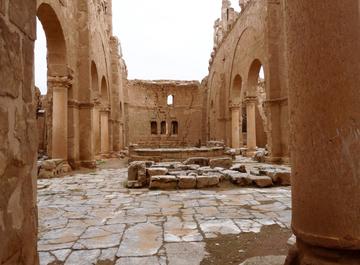Engagement with Digital Cultural Heritage Micro-Internship
With the Manar al-Athar Digital Archive and Wikipedia
Oxford University students are warmly invited to undertake a remote micro-internship with the Manar al-Athar Digital Archive in late June-early July 2022. This micro-internship was organised through the Careers Service Micro-Internship Programme. You can find out more about the experience of previous Manar al-Athar micro-interns here and here.
This micro-internship will focus on collaboration between the Manar al-Athar Digital Archive (www.manar-al-athar.ox.ac.uk), based in the Faculty of Classics at the University of Oxford, and Wikipedia.
The Manar al-Athar Digital Archive provides high-resolution, searchable images for teaching, research, publication, and heritage work. These images of archaeological sites and historic buildings cover the areas of the former Roman Empire which later came under Islamic rule (Syro-Palestine/the Levant, Egypt and North Africa), and adjoining regions, including the Caucasus and Turkey. The chronological range is from Alexander the Great through the Islamic period. Manar al-Athar means ‘Guide to Archaeology’ in Arabic.
The archive is open-access so that it can be freely used by anyone anywhere in the world. Photographs can be freely downloaded as original high-resolution images, without water marks, making them immediately available in a format suitable for publication or research, simply by acknowledging the source. Material is labelled in both English and Arabic to facilitate regional use.
Manar al-Athar was originally conceived as a resource for teaching and research, and the higher education sector (both in the UK and worldwide) remains a key audience. However, the archive is also seeking to widen its user base beyond academia and is currently exploring various means of engaging with other online platforms.
Working alongside the Manar al-Athar team, this micro-internship will provide the opportunity to undertake a short training session provided by a programme coordinator from Wikipedia UK. Focussing on a specific geographical region of the Middle East or North Africa, you will then map Wikipedia’s coverage of cultural heritage sites in that region, identifying sites of overlap with the Manar al-Athar Digital Archive, and adding links to Manar al-Athar photographs to relevant Wikipedia entries. Based on this work, you will also identify gaps in the coverage of both resources, and make recommendations of sites Manar al-Athar should prioritise for future work.
Wikipedia provides entries in a wide range of languages, and the information provided is not identical across languages. For those with the necessary language skills, it would be possible to work with Wikipedia entries in a language other than English. Those wishing to do so should indicate the language on which they would like to focus in their application.
Please note that, due to staff availability, this micro-internship will only be offered for the week 27 June – 1 July 2022.
What you will do
- Undertake a short training course delivered by a representative from Wikipedia.
- Working both independently and as part of a team, you will analyse Wikipedia coverage of cultural heritage sites of the Middle East and North Africa, identifying sites which overlap with Manar al-Athar’s photographic coverage, as well as key gaps in both resources’ coverage.
- You will edit Wikipedia entries for sites to include direct links to Manar al-Athar resources.
- You will present your work in team briefings, and in two written formats:
- You will write a short report to be used by the Manar al-Athar team outlining the level of correlation between Wikipedia’s and Manar al-Athar’s coverage of cultural heritage sites in the region on which you focussed, as well as making recommendations of key sites for expansion.
- You will also have the opportunity to publish on your experience and findings in a blog post.
What you will gain
By the end of the micro-internship you will have gained:
- An understanding of how Wikipedia functions and experience in editing Wikipedia entries.
- A knowledge of the major cultural heritage sites in a specific region of the Middle East or North Africa.
- Insight into how community engagement with digital cultural heritage can be developed, and experience of contributing to strategic plans for such engagement.
- Experience in writing for both a professional and a general audience.
- Experience in working as part of a team.
- Presentation skills.
Candidates will be considered from any subject area, from second-year undergraduate level and above. They should possess good written communication skills, experience of reviewing and summarising information, and the ability to work both independently and as part of a team. An interest in the cultural heritage of the Middle East and/or North Africa, the heritage sector (broadly defined), community engagement with research, and/or digital humanities is desirable.
Further details & how to apply
Application closing date: Monday 9 May, 2022, midday.
Reference ID: NDOGV
27 June – 1 July 2022. Please note that the Employer is unable to accommodate another week.
Students are required to commit to the full micro-internship - as with any professional placement - and any concerns about dates should be raised with the Internship Office in advance of making an application.
For more information and to apply, visit the Careers Service website.
Students are asked to provide:
- A CV
- A personal statement, explaining both why they are interested in the placement and the Manar al-Athar project, and why they would be well-suited to the post



